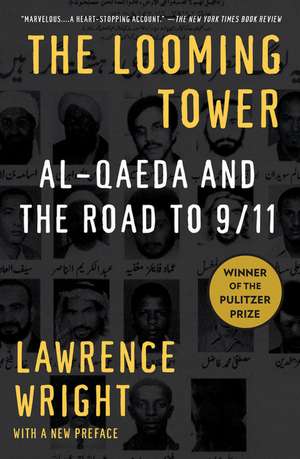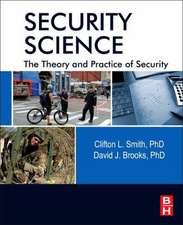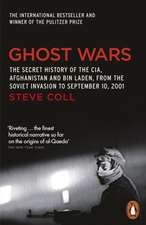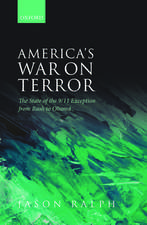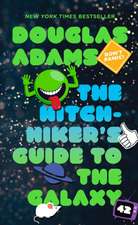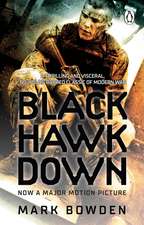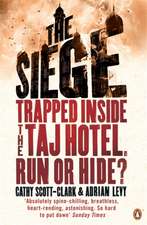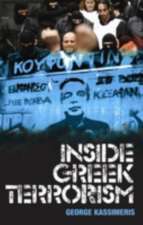The Looming Tower: Al-Qaeda and the Road to 9/11
Autor Lawrence Wrighten Limba Engleză Paperback – 31 aug 2007
Vezi toate premiile Carte premiată
Audies (2007)
National Book Award Finalist
A Time, Newsweek, Washington Post, Chicago Tribune, and New York Times Book Review Best Book of the Year
A gripping narrative that spans five decades, The Looming Tower explains in unprecedented detail the growth of Islamic fundamentalism, the rise of al-Qaeda, and the intelligence failures that culminated in the attacks on the World Trade Center. Lawrence Wright re-creates firsthand the transformation of Osama bin Laden and Ayman al-Zawahiri from incompetent and idealistic soldiers in Afghanistan to leaders of the most successful terrorist group in history. He follows FBI counterterrorism chief John O’Neill as he uncovers the emerging danger from al-Qaeda in the 1990s and struggles to track this new threat. Packed with new information and a deep historical perspective, The Looming Tower is the definitive history of the long road to September 11.
| Toate formatele și edițiile | Preț | Express |
|---|---|---|
| Paperback (2) | 92.02 lei 22-33 zile | +35.15 lei 6-12 zile |
| Penguin Books – 5 sep 2007 | 92.02 lei 22-33 zile | +35.15 lei 6-12 zile |
| Vintage Books USA – 31 aug 2007 | 120.66 lei 3-5 săpt. |
Preț: 120.66 lei
Nou
Puncte Express: 181
Preț estimativ în valută:
23.09€ • 24.16$ • 19.18£
23.09€ • 24.16$ • 19.18£
Carte disponibilă
Livrare economică 13-27 martie
Preluare comenzi: 021 569.72.76
Specificații
ISBN-13: 9781400030842
ISBN-10: 1400030846
Pagini: 540
Ilustrații: 16 PP. B&W; 1 MAP
Dimensiuni: 135 x 204 x 30 mm
Greutate: 0.57 kg
Editura: Vintage Books USA
ISBN-10: 1400030846
Pagini: 540
Ilustrații: 16 PP. B&W; 1 MAP
Dimensiuni: 135 x 204 x 30 mm
Greutate: 0.57 kg
Editura: Vintage Books USA
Notă biografică
Lawrence Wright graduated from Tulane University and spent two years teaching at the American University in Cairo, Egypt. He is a staff writer for The New Yorker and a fellow at the Center on Law and Security at New York University School of Law. The author of five works of nonfiction—City Children, Country Summer; In the New World; Saints and Sinners; Remembering Satan; and Twins—he has also written a novel, God’s Favorite, and was cowriter of the movie The Siege. He and his wife are longtime residents of Austin, Texas.
Extras
The Martyr
In a first-class stateroom on a cruise ship bound for New York from Alexandria, Egypt, a frail, middle-aged writer and educator named Sayyid Qutb experienced a crisis of faith. “Should I go to America as any normal student on a scholarship, who only eats and sleeps, or should I be special?” he wondered. “Should I hold on to my Islamic beliefs, facing the many sinful temptations, or should I indulge those temptations all around me?” It was November 1948. The new world loomed over the horizon, victorious, rich, and free. Behind him was Egypt, in rags and tears. The traveler had never been out of his native country. Nor had he willingly left now.
The stern bachelor was slight and dark, with a high, sloping forehead and a paintbrush moustache somewhat narrower than the width of his nose. His eyes betrayed an imperious and easily slighted nature. He always evoked an air of formality, favoring dark three-piece suits despite the searing Egyptian sun. For a man who held his dignity so close, the prospect of returning to the classroom at the age of forty-two may have seemed demeaning. And yet, as a child from a mud-walled village in Upper Egypt, he had already surpassed the modest goal he had set for himself of becoming a respectable member of the civil service. His literary and social criticism had made him one of his country’s most popular writers. It had also earned the fury of King Farouk, Egypt’s dissolute monarch, who had signed an order for his arrest. Powerful and sympathetic friends hastily arranged his departure.
At the time, Qutb (his name is pronounced kuh-tub) held a comfortable post as a supervisor in the Ministry of Education. Politically, he was a fervent Egyptian nationalist and anti-communist, a stance that placed him in the mainstream of the vast bureaucratic middle class. The ideas that would give birth to what would be called Islamic fundamentalism were not yet completely formed in his mind; indeed, he would later say that he was not even a very religious man before he began this journey, although he had memorized the Quran by the age of ten, and his writing had recently taken a turn toward more conservative themes. Like many of his compatriots, he was radicalized by the British occupation and contemptuous of the jaded King Farouk’s complicity. Egypt was racked by anti-British protests and seditious political factions bent on running the foreign troops out of the country—and perhaps the king as well. What made this unimposing, midlevel government clerk particularly dangerous was his blunt and potent commentary. He had never gotten to the front rank of the contemporary Arab literary scene, a fact that galled him throughout his career; and yet from the government’s point of view, he was becoming an annoyingly important enemy.
He was Western in so many ways—his dress, his love of classical music and Hollywood movies. He had read, in translation, the works of Darwin and Einstein, Byron and Shelley, and had immersed himself in French literature, especially Victor Hugo. Even before his journey, however, he worried about the advance of an all-engulfing Western civilization. Despite his erudition, he saw the West as a single cultural entity. The distinctions between capitalism and Marxism, Christianity and Judaism, fascism and democracy were insignificant by comparison with the single great divide in Qutb’s mind: Islam and the East on the one side, and the Christian West on the other.
America, however, stood apart from the colonialist adventures that had characterized Europe’s relations with the Arab world. America, at the end of the Second World War, straddled the political chasm between the colonizers and the colonized. Indeed, it was tempting to imagine America as the anticolonial paragon: a subjugated nation that had broken free and triumphantly outstripped its former masters. America’s power seemed to lie in its values, not in European notions of cultural superiority or privileged races and classes. And because America advertised itself as an immigrant nation, it had a permeable relationship with the rest of the world. Arabs, like most other peoples, had established their own colonies inside America, and the ropes of kinship drew them closer to the ideals that the country claimed to stand for.
And so, Qutb, like many Arabs, felt shocked and betrayed by the support that the U.S. government had given to the Zionist cause after the war. Even as Qutb was sailing out of Alexandria’s harbor, Egypt, along with five other Arab armies, was in the final stages of losing the war that established Israel as a Jewish state within the Arab world. The Arabs were stunned, not only by the determination and skill of the Israeli fighters but by the incompetence of their own troops and the disastrous decisions of their leaders. The shame of that experience would shape the Arab intellectual universe more profoundly than any other event in modern history. “I hate those Westerners and despise them!” Qutb wrote after President Harry Truman endorsed the transfer of a hundred thousand Jewish refugees into Palestine. “All of them, without any exception: the English, the French, the Dutch, and finally the Americans, who have been trusted by many.”
The man in the stateroom had known romantic love, but mainly the pain of it. He had written a thinly disguised account of a failed relationship in a novel; after that, he turned his back on marriage. He said that he had been unable to find a suitable bride from the “dishonorable” women who allowed themselves to be seen in public, a stance that left him alone and unconsoled in middle age. He still enjoyed women—he was close to his three sisters—but sexuality threatened him, and he had withdrawn into a shell of disapproval, seeing sex as the main enemy of salvation.
The dearest relationship he had ever enjoyed was that with his mother, Fatima, an illiterate but pious woman, who had sent her precocious son to Cairo to study. His father died in 1933, when Qutb was twenty-seven. For the next three years he taught in various provincial posts until he was transferred to Helwan, a prosperous suburb of Cairo, and he brought the rest of his family to live with him there. His intensely conservative mother never entirely settled in; she was always on guard against the creeping foreign influences that were far more apparent in Helwan than in the little village she came from. These influences must have been evident in her sophisticated son as well.
As he prayed in his stateroom, Sayyid Qutb was still uncertain of his own identity. Should he be “normal” or “special”? Should he resist temptations or indulge them? Should he hang on tightly to his Islamic beliefs or cast them aside for the materialism and sinfulness of the West? Like all pilgrims, he was making two journeys: one outward, into the larger world, and another inward, into his own soul. “I have decided to be a true Muslim!” he resolved. But almost immediately he second-guessed himself. “Am I being truthful or was that just a whim?”
His deliberations were interrupted by a knock on the door. Standing outside his stateroom was a young girl, whom he described as thin and tall and “half-naked.” She asked him in English, “Is it okay for me to be your guest tonight?”
Qutb responded that his room was equipped with only one bed.
“A single bed can hold two people,” she said.
Appalled, he closed the door in her face. “I heard her fall on the wooden floor outside and realized that she was drunk,” he recalled. “I instantly thanked God for defeating my temptation and allowing me to stick to my morals.”
This is the man, then—decent, proud, tormented, self-righteous, and resentful—whose lonely genius would unsettle Islam, threaten regimes across the Muslim world, and beckon to a generation of rootless young Arabs who were looking for meaning and purpose in their lives and would find it in jihad.
Qutb arrived in New York Harbor in the middle of the most prosperous holiday season the country had ever known. In the postwar boom, everybody was making money—Idaho potato farmers, Detroit automakers, Wall Street bankers—and all this wealth spurred confidence in the capitalist model, which had been so brutally tested during the recent Depression. Unemployment seemed practically un-American; officially, the rate of joblessness was under 4 percent, and practically speaking, anyone who wanted a job could get one. Half of the world’s total wealth was now in American hands.
The contrast with Cairo must have been especially bitter as Qutb wandered through the New York City streets, festively lit with holiday lights, the luxurious shop windows laden with appliances that he had only heard about—television sets, washing machines—technological miracles spilling out of every department store in stupefying abundance. Brand-new office towers and apartments were shouldering into the gaps in the Manhattan skyline between the Empire State Building and the Chrysler Building. Downtown and in the outer boroughs, vast projects were under way to house the immigrant masses.
It was fitting, in such a buoyant and confident environment, unprecedented in its mix of cultures, that the visible symbol of a changed world order was arising: the new United Nations complex overlooking the East River. The United Nations was the most powerful expression of the determined internationalism that was the legacy of the war, and yet the city itself already embodied the dreams of universal harmony far more powerfully than did any single idea or institution. The world was pouring into New York because that was where the power was, and the money, and the transforming cultural energy. Nearly a million Russians were in the city, half a million Irish, and an equal number of Germans—not to mention the Puerto Ricans, the Dominicans, the Poles, and the largely uncounted and often illegal Chinese laborers who had also found refuge in the welcoming city. The black population of the city had grown by 50 percent in only eight years, to 700,000, and they were refugees as well, from the racism of the American South. Fully a fourth of the 8 million New Yorkers were Jewish, many of whom had fled the latest European catastrophe. Hebrew letters covered the signs for the shops and factories on the Lower East Side, and Yiddish was commonly heard on the streets. That would have been a challenge for the middle-aged Egyptian who hated the Jews but, until he left his country, had never met one. For many New Yorkers, perhaps for most of them, political and economic oppression was a part of their heritage, and the city had given them sanctuary, a place to earn a living, to raise a family, to begin again. Because of that, the great emotion that fueled the exuberant city was hopefulness, whereas Cairo was one of the capitals of despair.
At the same time, New York was miserable—overfull, grouchy, competitive, frivolous, picketed with No Vacancy signs. Snoring alcoholics blocked the doorways. Pimps and pickpockets prowled the midtown squares in the ghoulish neon glow of burlesque houses. In the Bowery, flophouses offered cots for twenty cents a night. The gloomy side streets were crisscrossed with clotheslines. Gangs of snarling delinquents roamed the margins like wild dogs. For a man whose English was rudimentary, the city posed unfamiliar hazards, and Qutb’s natural reticence made communication all the more difficult. He was desperately homesick. “Here in this strange place, this huge workshop they call ‘the new world,’ I feel as though my spirit, thoughts, and body live in loneliness,” he wrote to a friend in Cairo. “What I need most here is someone to talk to,” he wrote another friend, “to talk about topics other than dollars, movie stars, brands of cars—a real conversation on the issues of man, philosophy, and soul.” Two days after Qutb arrived in America, he and an Egyptian acquaintance checked into a hotel. “The black elevator operator liked us because we were closer to his color,” Qutb reported. The operator offered to help the travelers find “entertainment.” “He mentioned examples of this ‘entertainment,’ which included perversions. He also told us what happens in some of these rooms, which may have pairs of boys or girls. They asked him to bring them some bottles of Coca-Cola, and didn’t even change their positions when he entered! ‘Don’t they feel ashamed?’ we asked. He was surprised. ‘Why? They are just enjoying themselves, satisfying their particular desires.’ ”
This experience, among many others, confirmed Qutb’s view that sexual mixing led inevitably to perversion. America itself had just been shaken by a lengthy scholarly report titled Sexual Behavior in the Human Male, by Alfred Kinsey and his colleagues at the University of Indiana. Their eight-hundred-page treatise, filled with startling statistics and droll commentary, shattered the country’s leftover Victorian prudishness like a brick through a stained-glass window. Kinsey reported that 37 percent of the American men he sampled had experienced homosexual activity to the point of orgasm, nearly half had engaged in extramarital sex, and 69 percent had paid for sex with prostitutes. The mirror that Kinsey held up to America showed a country that was frantically lustful but also confused, ashamed, incompetent, and astoundingly ignorant. Despite the evidence of the diversity and frequency of sexual activity, this was a time in America when sexual matters were practically never discussed, not even by doctors. One Kinsey researcher interviewed a thousand childless American couples who had no idea why they failed to conceive, even though the wives were virgins.
Qutb was familiar with the Kinsey Report, and referenced it in his later writings to illustrate his view of Americans as little different from beasts—“a reckless, deluded herd that only knows lust and money.” A staggering rate of divorce was to be expected in such a society, since “Every time a husband or wife notices a new sparkling personality, they lunge for it as if it were a new fashion in the world of desires.” The turbulent overtones of his own internal struggles can be heard in his diatribe: “A girl looks at you, appearing as if she were an enchanting nymph or an escaped mermaid, but as she approaches, you sense only the screaming instinct inside her, and you can smell her burning body, not the scent of perfume but flesh, only flesh. Tasty flesh, truly, but flesh nonetheless.”
The end of the world war had brought America victory but not security. Many Americans felt that they had defeated one totalitarian enemy only to encounter another far stronger and more insidious than European fascism. “Communism is creeping inexorably into these destitute lands,” the young evangelist Billy Graham warned, “into war-torn China, into restless South America, and unless the Christian religion rescues these nations from the clutch of the unbelieving, America will stand alone and isolated in the world.”
From the Hardcover edition.
In a first-class stateroom on a cruise ship bound for New York from Alexandria, Egypt, a frail, middle-aged writer and educator named Sayyid Qutb experienced a crisis of faith. “Should I go to America as any normal student on a scholarship, who only eats and sleeps, or should I be special?” he wondered. “Should I hold on to my Islamic beliefs, facing the many sinful temptations, or should I indulge those temptations all around me?” It was November 1948. The new world loomed over the horizon, victorious, rich, and free. Behind him was Egypt, in rags and tears. The traveler had never been out of his native country. Nor had he willingly left now.
The stern bachelor was slight and dark, with a high, sloping forehead and a paintbrush moustache somewhat narrower than the width of his nose. His eyes betrayed an imperious and easily slighted nature. He always evoked an air of formality, favoring dark three-piece suits despite the searing Egyptian sun. For a man who held his dignity so close, the prospect of returning to the classroom at the age of forty-two may have seemed demeaning. And yet, as a child from a mud-walled village in Upper Egypt, he had already surpassed the modest goal he had set for himself of becoming a respectable member of the civil service. His literary and social criticism had made him one of his country’s most popular writers. It had also earned the fury of King Farouk, Egypt’s dissolute monarch, who had signed an order for his arrest. Powerful and sympathetic friends hastily arranged his departure.
At the time, Qutb (his name is pronounced kuh-tub) held a comfortable post as a supervisor in the Ministry of Education. Politically, he was a fervent Egyptian nationalist and anti-communist, a stance that placed him in the mainstream of the vast bureaucratic middle class. The ideas that would give birth to what would be called Islamic fundamentalism were not yet completely formed in his mind; indeed, he would later say that he was not even a very religious man before he began this journey, although he had memorized the Quran by the age of ten, and his writing had recently taken a turn toward more conservative themes. Like many of his compatriots, he was radicalized by the British occupation and contemptuous of the jaded King Farouk’s complicity. Egypt was racked by anti-British protests and seditious political factions bent on running the foreign troops out of the country—and perhaps the king as well. What made this unimposing, midlevel government clerk particularly dangerous was his blunt and potent commentary. He had never gotten to the front rank of the contemporary Arab literary scene, a fact that galled him throughout his career; and yet from the government’s point of view, he was becoming an annoyingly important enemy.
He was Western in so many ways—his dress, his love of classical music and Hollywood movies. He had read, in translation, the works of Darwin and Einstein, Byron and Shelley, and had immersed himself in French literature, especially Victor Hugo. Even before his journey, however, he worried about the advance of an all-engulfing Western civilization. Despite his erudition, he saw the West as a single cultural entity. The distinctions between capitalism and Marxism, Christianity and Judaism, fascism and democracy were insignificant by comparison with the single great divide in Qutb’s mind: Islam and the East on the one side, and the Christian West on the other.
America, however, stood apart from the colonialist adventures that had characterized Europe’s relations with the Arab world. America, at the end of the Second World War, straddled the political chasm between the colonizers and the colonized. Indeed, it was tempting to imagine America as the anticolonial paragon: a subjugated nation that had broken free and triumphantly outstripped its former masters. America’s power seemed to lie in its values, not in European notions of cultural superiority or privileged races and classes. And because America advertised itself as an immigrant nation, it had a permeable relationship with the rest of the world. Arabs, like most other peoples, had established their own colonies inside America, and the ropes of kinship drew them closer to the ideals that the country claimed to stand for.
And so, Qutb, like many Arabs, felt shocked and betrayed by the support that the U.S. government had given to the Zionist cause after the war. Even as Qutb was sailing out of Alexandria’s harbor, Egypt, along with five other Arab armies, was in the final stages of losing the war that established Israel as a Jewish state within the Arab world. The Arabs were stunned, not only by the determination and skill of the Israeli fighters but by the incompetence of their own troops and the disastrous decisions of their leaders. The shame of that experience would shape the Arab intellectual universe more profoundly than any other event in modern history. “I hate those Westerners and despise them!” Qutb wrote after President Harry Truman endorsed the transfer of a hundred thousand Jewish refugees into Palestine. “All of them, without any exception: the English, the French, the Dutch, and finally the Americans, who have been trusted by many.”
The man in the stateroom had known romantic love, but mainly the pain of it. He had written a thinly disguised account of a failed relationship in a novel; after that, he turned his back on marriage. He said that he had been unable to find a suitable bride from the “dishonorable” women who allowed themselves to be seen in public, a stance that left him alone and unconsoled in middle age. He still enjoyed women—he was close to his three sisters—but sexuality threatened him, and he had withdrawn into a shell of disapproval, seeing sex as the main enemy of salvation.
The dearest relationship he had ever enjoyed was that with his mother, Fatima, an illiterate but pious woman, who had sent her precocious son to Cairo to study. His father died in 1933, when Qutb was twenty-seven. For the next three years he taught in various provincial posts until he was transferred to Helwan, a prosperous suburb of Cairo, and he brought the rest of his family to live with him there. His intensely conservative mother never entirely settled in; she was always on guard against the creeping foreign influences that were far more apparent in Helwan than in the little village she came from. These influences must have been evident in her sophisticated son as well.
As he prayed in his stateroom, Sayyid Qutb was still uncertain of his own identity. Should he be “normal” or “special”? Should he resist temptations or indulge them? Should he hang on tightly to his Islamic beliefs or cast them aside for the materialism and sinfulness of the West? Like all pilgrims, he was making two journeys: one outward, into the larger world, and another inward, into his own soul. “I have decided to be a true Muslim!” he resolved. But almost immediately he second-guessed himself. “Am I being truthful or was that just a whim?”
His deliberations were interrupted by a knock on the door. Standing outside his stateroom was a young girl, whom he described as thin and tall and “half-naked.” She asked him in English, “Is it okay for me to be your guest tonight?”
Qutb responded that his room was equipped with only one bed.
“A single bed can hold two people,” she said.
Appalled, he closed the door in her face. “I heard her fall on the wooden floor outside and realized that she was drunk,” he recalled. “I instantly thanked God for defeating my temptation and allowing me to stick to my morals.”
This is the man, then—decent, proud, tormented, self-righteous, and resentful—whose lonely genius would unsettle Islam, threaten regimes across the Muslim world, and beckon to a generation of rootless young Arabs who were looking for meaning and purpose in their lives and would find it in jihad.
Qutb arrived in New York Harbor in the middle of the most prosperous holiday season the country had ever known. In the postwar boom, everybody was making money—Idaho potato farmers, Detroit automakers, Wall Street bankers—and all this wealth spurred confidence in the capitalist model, which had been so brutally tested during the recent Depression. Unemployment seemed practically un-American; officially, the rate of joblessness was under 4 percent, and practically speaking, anyone who wanted a job could get one. Half of the world’s total wealth was now in American hands.
The contrast with Cairo must have been especially bitter as Qutb wandered through the New York City streets, festively lit with holiday lights, the luxurious shop windows laden with appliances that he had only heard about—television sets, washing machines—technological miracles spilling out of every department store in stupefying abundance. Brand-new office towers and apartments were shouldering into the gaps in the Manhattan skyline between the Empire State Building and the Chrysler Building. Downtown and in the outer boroughs, vast projects were under way to house the immigrant masses.
It was fitting, in such a buoyant and confident environment, unprecedented in its mix of cultures, that the visible symbol of a changed world order was arising: the new United Nations complex overlooking the East River. The United Nations was the most powerful expression of the determined internationalism that was the legacy of the war, and yet the city itself already embodied the dreams of universal harmony far more powerfully than did any single idea or institution. The world was pouring into New York because that was where the power was, and the money, and the transforming cultural energy. Nearly a million Russians were in the city, half a million Irish, and an equal number of Germans—not to mention the Puerto Ricans, the Dominicans, the Poles, and the largely uncounted and often illegal Chinese laborers who had also found refuge in the welcoming city. The black population of the city had grown by 50 percent in only eight years, to 700,000, and they were refugees as well, from the racism of the American South. Fully a fourth of the 8 million New Yorkers were Jewish, many of whom had fled the latest European catastrophe. Hebrew letters covered the signs for the shops and factories on the Lower East Side, and Yiddish was commonly heard on the streets. That would have been a challenge for the middle-aged Egyptian who hated the Jews but, until he left his country, had never met one. For many New Yorkers, perhaps for most of them, political and economic oppression was a part of their heritage, and the city had given them sanctuary, a place to earn a living, to raise a family, to begin again. Because of that, the great emotion that fueled the exuberant city was hopefulness, whereas Cairo was one of the capitals of despair.
At the same time, New York was miserable—overfull, grouchy, competitive, frivolous, picketed with No Vacancy signs. Snoring alcoholics blocked the doorways. Pimps and pickpockets prowled the midtown squares in the ghoulish neon glow of burlesque houses. In the Bowery, flophouses offered cots for twenty cents a night. The gloomy side streets were crisscrossed with clotheslines. Gangs of snarling delinquents roamed the margins like wild dogs. For a man whose English was rudimentary, the city posed unfamiliar hazards, and Qutb’s natural reticence made communication all the more difficult. He was desperately homesick. “Here in this strange place, this huge workshop they call ‘the new world,’ I feel as though my spirit, thoughts, and body live in loneliness,” he wrote to a friend in Cairo. “What I need most here is someone to talk to,” he wrote another friend, “to talk about topics other than dollars, movie stars, brands of cars—a real conversation on the issues of man, philosophy, and soul.” Two days after Qutb arrived in America, he and an Egyptian acquaintance checked into a hotel. “The black elevator operator liked us because we were closer to his color,” Qutb reported. The operator offered to help the travelers find “entertainment.” “He mentioned examples of this ‘entertainment,’ which included perversions. He also told us what happens in some of these rooms, which may have pairs of boys or girls. They asked him to bring them some bottles of Coca-Cola, and didn’t even change their positions when he entered! ‘Don’t they feel ashamed?’ we asked. He was surprised. ‘Why? They are just enjoying themselves, satisfying their particular desires.’ ”
This experience, among many others, confirmed Qutb’s view that sexual mixing led inevitably to perversion. America itself had just been shaken by a lengthy scholarly report titled Sexual Behavior in the Human Male, by Alfred Kinsey and his colleagues at the University of Indiana. Their eight-hundred-page treatise, filled with startling statistics and droll commentary, shattered the country’s leftover Victorian prudishness like a brick through a stained-glass window. Kinsey reported that 37 percent of the American men he sampled had experienced homosexual activity to the point of orgasm, nearly half had engaged in extramarital sex, and 69 percent had paid for sex with prostitutes. The mirror that Kinsey held up to America showed a country that was frantically lustful but also confused, ashamed, incompetent, and astoundingly ignorant. Despite the evidence of the diversity and frequency of sexual activity, this was a time in America when sexual matters were practically never discussed, not even by doctors. One Kinsey researcher interviewed a thousand childless American couples who had no idea why they failed to conceive, even though the wives were virgins.
Qutb was familiar with the Kinsey Report, and referenced it in his later writings to illustrate his view of Americans as little different from beasts—“a reckless, deluded herd that only knows lust and money.” A staggering rate of divorce was to be expected in such a society, since “Every time a husband or wife notices a new sparkling personality, they lunge for it as if it were a new fashion in the world of desires.” The turbulent overtones of his own internal struggles can be heard in his diatribe: “A girl looks at you, appearing as if she were an enchanting nymph or an escaped mermaid, but as she approaches, you sense only the screaming instinct inside her, and you can smell her burning body, not the scent of perfume but flesh, only flesh. Tasty flesh, truly, but flesh nonetheless.”
The end of the world war had brought America victory but not security. Many Americans felt that they had defeated one totalitarian enemy only to encounter another far stronger and more insidious than European fascism. “Communism is creeping inexorably into these destitute lands,” the young evangelist Billy Graham warned, “into war-torn China, into restless South America, and unless the Christian religion rescues these nations from the clutch of the unbelieving, America will stand alone and isolated in the world.”
From the Hardcover edition.
Recenzii
“Marvelous. . . . Not just a heart-stopping account of the events leading up to 9/11, written with style and verve. . . . A thoughtful examination of the world that produced the men who brought us 9/11.” —The New York Times Book Review“At once wrenchingly intimate and boldly sweeping in its historical perspective. . . . A narrative history that possesses all the immediacy and emotional power of a novel.” —The New York Times“A stunningly well-researched opus that puts the catastrophe in vibrant context.” —Entertainment Weekly“Lawrence Wright’s book is my new touchstone. None of the previous books led me to say ‘Aha, now I think I understand’ as frequently.” —Steve Weinberg, The Boston Globe“Should be required reading for every American; yes, it is that good. It is hard to imagine a better portrait of 9/11 and its causes emerging anytime soon.”—The Christian Science Monitor “Powerful and important . . . a history of a man and a movement, replete with the accidents of history and historic inevitability.” —Kevin Horrigan, St. Louis Post-Dispatch“Don’t read The Looming Tower in bed. This book requires a straight spine and full attention . . . The reporting is so good that it will matter in 100 years. Wright’s determined, disciplined work has made his book indispensable. “ —Karen Long, The Plain Dealer“A page-turner . . . encompassing religion, politics, economics and more. If you’ve been meaning to sharpen your understanding of what all led up to September 11, 2001, then Wright may have written just what you’ve been waiting for.” —Tom Gallagher, San Francisco Chronicle“Brilliant . . . describes the contorted intellectual journey that has taken place among some Muslims which allows a holy book that appears to condemn suicide and the killing on innocents to be used to justify catastrophic terrorism.” —Stephen Fidler, Financial Times“A magisterial, beautifully crafted narrative . . . This focus on character, along with Wright’s five years of fierce on-the-ground reporting (he lists 560 interviewees), pays off.” —Daniel Kurtz-Phelan, Los Angeles Times“Deeply researched . . . immaculately crafted.” —Peter Bergen, The Wall Street Journal “What a riveting tale Lawrence Wright fashions in this marvelous book. ‘The Looming Tower’ is not just a detailed, heart-stopping account of the events leading up to 9/11, written with style and verve. [It’s] a thoughtful examination of the world that produced the men who brought us 9/11, and of their progeny who bedevil us today. The portrait of John O’Neill, the driven, demon-ridden F.B. I. agent who worked so frantically to stop Osama bin Laden, only to perish in the attack on the World Trade Center, is worth the price of the book alone. ‘The Looming Tower’ is a thriller. And it’s a tragedy, too.”–Dexter Filkins, The New York Times Book Review cover“Dozens of intricately reported books about 9/11 are already available; I had read perhaps half of them [before] starting The Looming Tower. But Lawrence Wright’s book is my new touchstone. None of the previous books led me to say ‘Aha, now I think I understand’ as frequently.” —Steve Weinberg, The Boston Globe“A magisterial, beautifully crafted narrative . . . This focus on character, along with Wright’s five years of fierce on-the-ground reporting (he lists 560 interviewees), pays off.” —Daniel Kurtz-Phelan, Los Angeles Times“Deeply researched . . . immaculately crafted.” —Peter Bergen, The Wall Street Journal “A searing view of the tragic events of September 11, 2001, a view that is at once wrenchingly intimate and boldly sweeping in its historical perspective . . . a narrative history that possesses all the immediacy and emotional power of a novel, an account that indelibly illustrates how the political and the personal, the public and the private were often inextricably intertwined.”–Michiko Kakutani, The New York Times“Important, gripping . . . One of the best books yet on the history of terrorism.” —Publishers Weekly, starred review“Lawrence Wright provides a graceful and remarkably intimate set of portraits of the people who brought us 9/11. It is a tale of extravagant zealotry and incessant bumbling that would be merely absurd if the consequences were not so grisly.” —Gary Sick"Lawrence Wright's integrity and diligence as a reporter shine through every page of this riveting narrative." —Robert A. Caro “A towering achievement. One of the best and more important books of recent years. Lawrence Wright has dug deep into and written well a story every American should know. A masterful combination of reporting and writing.” —Dan Rather“Comprehensive and compelling…Wright has written what must be considered a definitive work on the antecedents to 9/11…Essential for an understanding of that dreadful day.”--starred Kirkus review
Descriere
This national bestseller and award-winning book is now available in paperback. A gripping narrative that spans five decades, "The Looming Tower" explains in unprecedented detail the rise of al-Qaeda and the intelligence failures that culminated in the attacks on 9/11.
Premii
- Audies Finalist, 2007
